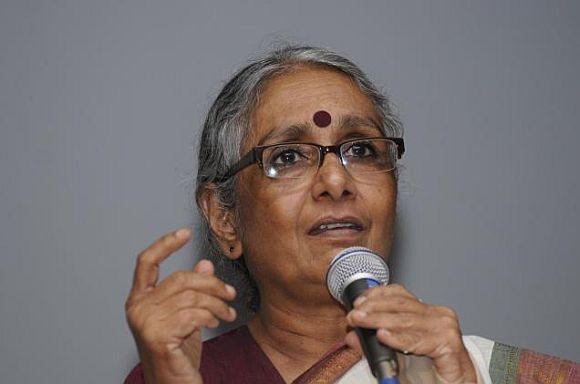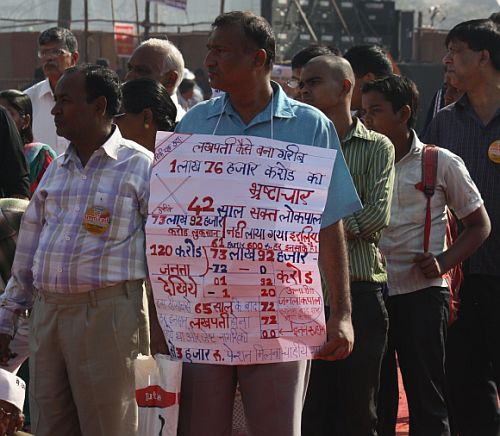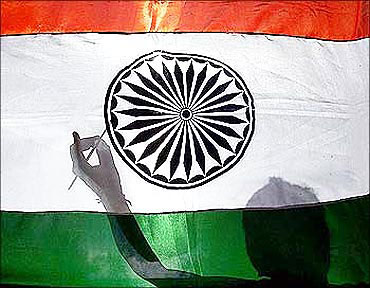 | « Back to article | Print this article |
'If the youth act with integrity, they will help change India'
In this interview, RTI and social activist Aruna Roy talks about quitting Civil Services to pursue social service and how the youth of the country can play a role in bringing soci-political change and more. Read on.
Aruna Roy, who quit IAS (Indian Administrative Service), is a social activist best known as a leading voice behind people's struggle for Right To Information, employment and food. She shares her experiences with us.
Under what circumstances or nurturing which idea did you decide to leave civil services to pursue social service?
The bureaucracy is a necessary part of governance, and the bureaucratic system, an institution that exists to maintain the status quo.
People continue to perceive it as having exaggerated power and prestige -- a definite hangover of the colonial regime. What we perhaps need to do is to see bureaucracy as essential, but not sufficient for governance.
We cannot expect the system to work towards change. I felt stalled by the inherent instinct to maintain the status quo.
I left because my journey was chartered, not so much by interest in the system as an end in itself, but in bringing social and economic justice to the poor.
This begs for us to challenge the way things are, especially corruption and the arbitrary use of power.
I also left the IAS because I wanted to see the beginning and the end of an issue. I wanted to work with people, and not with papers dealing with them.
'The youth have an essential role to play in defining the world they live in'
What is your biggest achievement so far? Are you satisfied with your work?
Any achievement is of the collective. The MKSS in being able to define the genesis of the RTI and in participation of the struggle for the NREGA , which ended with the laws passed in 2005 has been its most important contribution. But this is the large canvas.
There have been innumerable significant but smaller successes in issues in which I have been a part of ordinary people's struggles for a better world.
The important part of life is not the achievement but the determination to continue to protest against oppression and injustice. We must continue to learn from experiences and people around us every day.
What role youth can play in bringing socio-political change? How is your experience of working with youngsters?
The youth have an essential role to play in defining the world they live in.
They have to realise that life demands engagement with larger issues of public and social engagement is essential, but it has to be built on values of equality, tolerance and compassion for those who have less.
While their involvement with public action to push the frontiers and definitions of a participatory democracy are important, public action should be tempered with a continual willingness to learn.
Historic learning and principles have to be respected and learnt from.
The energy of youth should be channelised through the three processes Gandhiji and Shankar Guha Neogi talked about- sangharsh, sewa and nirman. All three require vision determination and commitment. But in each one we can define our own boundaries.
'The Lokpal may end up doing nothing effectively'
With the RTI you led a big step in fighting corruption, but your differences with team Anna on Jan Lokpal bill captured much attention. On what points does the difference exist?
We support the need for a strong, effective and comprehensive legislation to tackle corruption, mis-governance, and are therefore basically in agreement with the major goals of the draft Jan Lok Pal Bill.
However, we believe that the Lokpal should be an independent body that has a focused and actionable mandate of dealing with grand corruption, and corruption in the highest echelons of power.
Our major concern is that the Jan Lokpal Bill seeks to place too much power and responsibility in one institution.
Expanding the mandate of the Lokpal to include grievances, misconduct, judicial accountability etc will over burden the Lokpal, and in mandating it to correct everything, the Lokpal may end up doing nothing effectively.
Equally important, this would concentrate too much power in the Lokpal, not be subject to adequate checks and balances, and might violate the basic constitutional principle of separation of powers.
We felt that it was more useful for us to examine the possibilities of formulating a basket of measures that would create separate institutions to deal with the lack of effective oversight and accountability in each sector.
Protection for whistleblowers, misconduct, reform of the CVC, grievance redress, and grand and petty corruption have thrown up unique challenges.
Each sector needs its own framework that is appropriate, adequately empowered, independent, and is eventually accountable to the people. That is why we proposed to work on each of these issues in separately, while building a campaign for them to come into effect simultaneously.
How you assess your experience as NAC member?
My experience at the NAC has been interesting. The composition of the NAC is varied. It has MPs, representatives of the Planning Commission, retired civil servants, serving members of UN agencies, corporate sector representative and members who represent a cross section of sectors -- NGOs, campaigns and movements.
The diverse representation makes it an interesting platform to learn about each other's opinions and constraints when dealing with issues concerning social policy.
'All my interactions with youth have given me hope'
What is your take on the youth of the country? Do you see a shift in the me mine attitude of the early 2000?
My work has made me interact with a cross section of people including youth, rural and urban.
Though I meet them professionally to begin with, I have seen them at close quarters because of the rural environment and our life style. All my interactions with youth have given me hope.
The recent interest in participatory modes of legislation and governance has taken us too many colleges where interested young people have invited us to share our ideas.
Their interest has gone beyond the details of the legislation to larger issues of democracy and the nature of participatory engagement. I have been very impressed by the questions raised not only on the details of the Lokpal, but what has followed.
Questions and nuanced statements about the nature of public protests and the role and value of dissent have been discussed.
Their comments on the role of the electronic media which sees issues in a unipolar format have been very educative, and have made amply clear that viewers are mature and want serious debate rather than one liners and heckling anchors.
Do you think youth of today are actively involved in nation building?
There are many students who are genuinely interested in knowing how the rest of the India, i.e. Bharat lives and works. Some of them are interested and passionate about learning about societal and political relations.
A few make the transition from learning to unlearning, essential for an individual conditioned by the urban environment.
Where is the youth of today going?
Youth today are poised at the cross roads, with extraordinary advantages, they are not pressurised to adhere to stereotypical professions and life decisions.
They can push boundaries; if they are patient enough to wait and discover their true passions, concerns and talents, and if they act with integrity, they will help change India.



